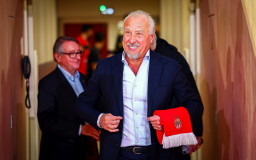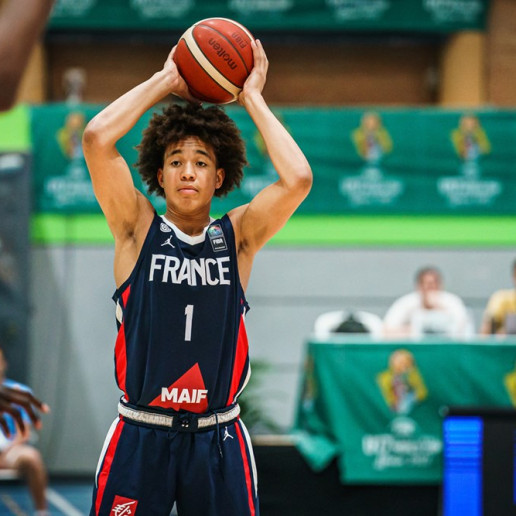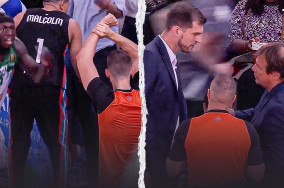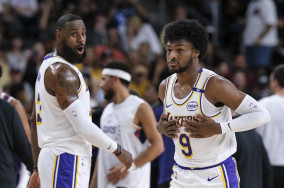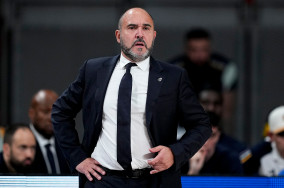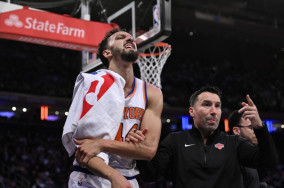The New York Knicks had to use some salary cap creativity to make the trade that brought Karl-Anthony Towns possible. However, the decisive element was the sacrifice a young French rookie, Pacome Dadiet, made.
The New York Knicks had a decidedly active offseason. The Big Apple team was able to bag two significant trades, bringing first Mikal Bridges and then Karl-Anthony Towns to New York.
Karl-Anthony Towns
| Position: | C |
| Age: | 28 |
| Height: | 213 cm |
| Weight: | 112 kg |
| Birth place: | New Jersey, United States of America |
New York management was particularly active in the weeks and hours before this year's draft, held on June 26 and 27.
The trade deal that brought Bridges to New York happened on the evening of June 26. The Knicks convinced the Nets with an offer that included Bojan Bogdanovic, Shake Milton, four future first-round picks, and a first-round pick swap.
Despite the agreement to bring in Mikal Bridges, Knicks management already planned to get to another star.
However, considering the restrictions imposed by the new collective bargaining agreement, it was necessary to be quite creative financially to do so.
The New York franchise had two picks, 24 and 25, in the first round of the draft. The Knicks already decided to give up at least one of them to have a little more salary flexibility.
Therefore, the Knicks decided to give up the number 24 pick, which later became Kyshawn George, to the Washington Wizards and keep the number 25 pick instead.
In the NBA, players selected in the first round of the draft already have a clear idea of what kind of salary they will earn.
The salaries for first-rounders are already predetermined based on the rookie scale system, which provides that rookies chosen in the first round can earn up to a maximum of 120% of the amount offered by the rookie scale and up to a minimum of 80%.
Of course, in most cases, rookies get 120% of the amount provided by the rookie scale. However, as mentioned earlier, the Knicks needed some financial creativity, so they started the rumor that whoever was picked in the 25th would have to settle for 80% of the rookie scale salary.
One of the prospects the Knicks were considering for that pick was Pacome Dadiet, an 18-year-old Frenchman who had just finished the season with Ratiopharm Ulm.
When the player and his entourage realized they could go to New York, they started doing whatever was possible to make that scenario a reality.
Dadiet's agents, Frenchman Yann Balikouzou and his U.S. counterpart David Baumann, explained to their client that the chance to play for the Knicks was real but that to make it work, the player would have to settle for a lower figure than the maximum amount expected for his choice, which was $2.7 million.
The Knicks had let several agents know that whoever they chose, that player would have to settle for 80 percent of the rookie scale, thus $1.8 million.
The young French player, who comes from a family of Ivory Coast descent, had a humble childhood and had earned about 40,000 euros the previous season with Ratiopharm Ulm, so it was a rather easy choice for him to give up about $700,000 to join the Knicks.
By accepting the Knicks' proposal, Dadiet became the first player to sign for 80 percent of the expected rookie scale amount from 2019.
When Dadiet signed with the Knicks, his decision to choose a lower figure was seen as a mere salary detail.
However, the young French player's choice was instrumental in allowing the Knicks to reach Karl-Anthony Towns.
Of course, the decision to include Donte DiVincenzo, a player the Timberwolves had long valued in the trade, also certainly helped make the deal go through. Still, without the savings procured by Dadiet's choice, the trade for Karl-Anthony Towns simply would not have been possible.
Had the French player signed the standard rookie contract, that is, at 120 percent of the rookie scale, the Knicks would not have had the salary space needed to make the trade work, and everything would have been much more complex.
The reality of the new collective bargaining agreement, which places no small amount of restrictions on those teams above the luxury tax level, prompts GMs and front offices to find creative solutions to further improve their rosters.
The Knicks found more than one during this offseason, including adding Duane Washington's contract to the trade for Towns, a player who had since settled in Europe with Partizan Belgrade.
Although it is still hard to imagine what kind of trajectory the career of a player as young as Dadiet may take, for the Knicks, his presence and availability were crucial in gaining the much-coveted star that management wanted to add to an already quite competitive core.
Even if the French player's on-court impact falls short, Knicks fans can always thank him for making it possible to reach a player like Karl-Anthony Towns.
In the meantime, this deal and others made by the Knicks during the offseason highlight the impact of the new collective bargaining agreement.
It forces franchises, especially high-spending ones, to operate within the constraints of the salary cap. Teams must find creative solutions to strengthen their rosters without worsening their financial situation at the luxury tax level.
We have officially entered a new era of the NBA, one in which even the smallest detail at the salary cap level can be critical in achieving the most ambitious goals.

